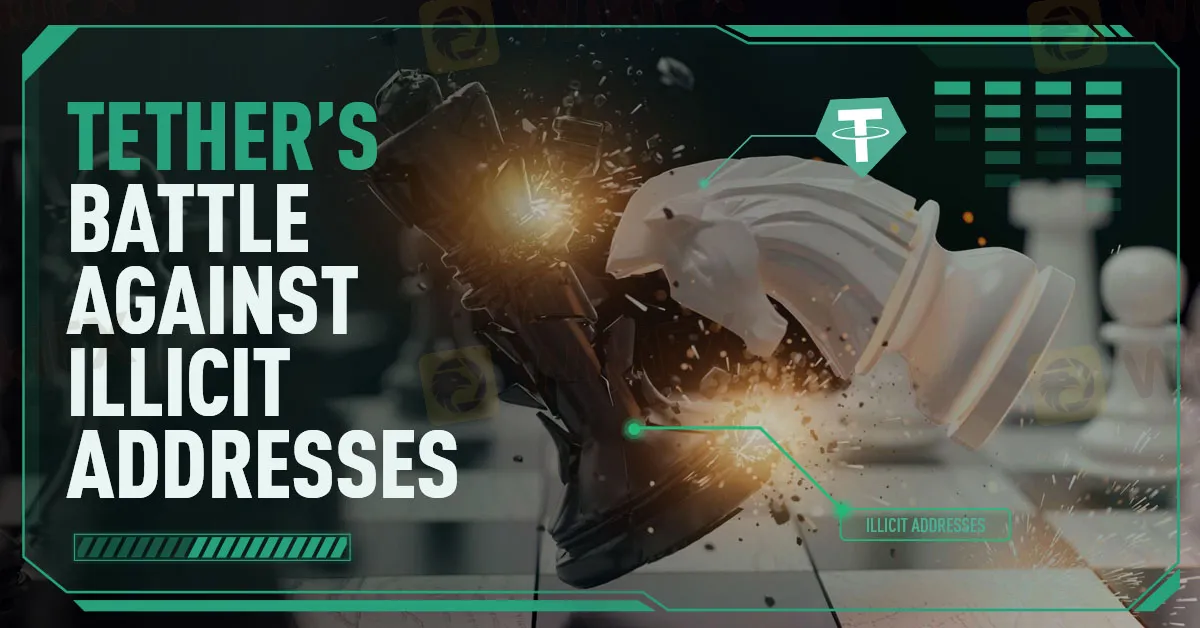简体中文
繁體中文
English
Pусский
日本語
ภาษาไทย
Tiếng Việt
Bahasa Indonesia
Español
हिन्दी
Filippiiniläinen
Français
Deutsch
Português
Türkçe
한국어
العربية
Tether’s Battle Against Illicit Addresses
Abstract:Tether, the primary issuer of the largest stablecoin globally, takes action against more than 30 cryptocurrency addresses, barring their access, after receiving billions in USDT tokens.

Tether, the issuer responsible for the world's largest stablecoin, has recently taken action against over 30 cryptocurrency addresses that collectively received billions in USDT tokens.
This significant manoeuvre, representing a noteworthy operation for Tether, was executed in collaboration with Chainargos, a prominent blockchain intelligence firm.
The specified addresses had received a total of $161 million from Whitebit, a European cryptocurrency exchange rooted in Ukraine. A substantial number of these addresses were involved in handling STUSDT, a token acquired through USDT staking.
Chainargos had earlier identified multiple wallets engaged in “programmatic spamming” activities, involving small-scale transactions of STUSDT, an observation made as far back as August.
Commencing on December 1, Tether initiated the freezing of 28 of these addresses. Subsequently, on December 2, an additional six addresses were blacklisted for moving over $10 million, equating to approximately $1 million in assets. Most of the frozen wallets were linked to STUSDT transactions.

While Tether has refrained from offering specific rationales for these actions, the stablecoin entity has been collaborating with the U.S. Department of Justice (DOJ) in freezing funds associated with illicit activities. Notably, Tether recently voluntarily froze $225 million connected to human trafficking groups in Southeast Asia, marking it as the “largest-ever freeze of USDT.”
Tether's USDT holds the position of the third-largest cryptocurrency by market capitalization and is extensively utilized for trading and value exchange within the cryptocurrency landscape.
In an earlier instance in November, Tether, alongside Bitfinex, its sister crypto exchange, opted to retract their opposition to a Freedom of Information Law (FOIL) request, spurred by journalists such as Zeke Faux from Bloomberg Businessweek.
In an official statement, the stablecoin issuer conveyed that this decision aligns with their commitment to transparency. However, they clarified that not all documents would be disclosed, citing standard business practices.
Tether levied criticism against Zeke Faux's past work, suggesting deviations from traditional journalistic standards. Additionally, the statement highlighted instances of what they referred to as “biased and factually inaccurate reporting” from several media outlets, including the Wall Street Journal and Bloomberg, whose journalists were involved in the FOIL request.
This is not Tether's initial encounter with a FOIL request; they previously attempted to obstruct a request by CoinDesk seeking documents about Tether's reserves amid an inquiry by the New York Attorney General (NYAG) into the full backing of USDT by reserves. Post a legal defeat, Tether has opted not to pursue an appeal and has agreed to engage with journalists and regulators who uphold ethical reporting standards and respect privacy.

Disclaimer:
The views in this article only represent the author's personal views, and do not constitute investment advice on this platform. This platform does not guarantee the accuracy, completeness and timeliness of the information in the article, and will not be liable for any loss caused by the use of or reliance on the information in the article.
Read more

How Crypto Trading Transforms FX and CFD Brokerage Industry
Explore how crypto trading reshapes FX and CFD brokerage with innovative products, liquidity solutions, and regulations in 2025.

Why More People Are Trading Online Today?
Discover why online trading is booming with tech, AI, and a push for financial freedom. From stocks to crypto, it’s a thrilling hustle for all.

SEC Ends Crypto.com Probe, No Action Taken by Regulator
The SEC has closed its investigation into Crypto.com with no action taken. Crypto.com celebrates regulatory clarity and renewed momentum for the crypto industry.

Interactive Brokers Expands Crypto Trading with Solana, XRP, Cardano, and Dogecoin
Interactive Brokers adds Solana, XRP, Cardano, and Dogecoin to its platform, enabling U.S. and U.K. clients to trade crypto 24/7 with low fees.
WikiFX Broker
Latest News
How Crypto Trading Transforms FX and CFD Brokerage Industry
FCA Warns Against 10 Unlicensed or Clone Firms
CySEC Warns Against 14 Unlicensed Investment Websites
Top Currency Pairs to Watch for Profit This Week - March 31, 2025
Will natural disasters have an impact on the forex market?
Philippines Deports 29 Indonesians Linked to Online Scam Syndicate in Manila
Exposed: Deceptive World of Fake Trading Gurus – Don’t Get Fooled!
AI-Powered Strategies to Improve Profits in Forex Trading
Stock Market Trading Volume Drops by 97.58 Billion Naira This Month
Why does your mood hinder you from getting the maximum return from an investment?
Currency Calculator







